

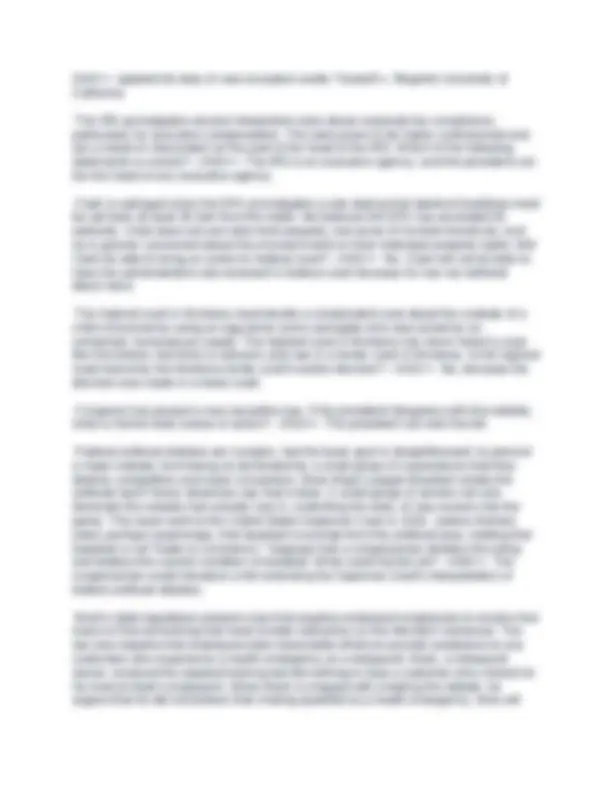
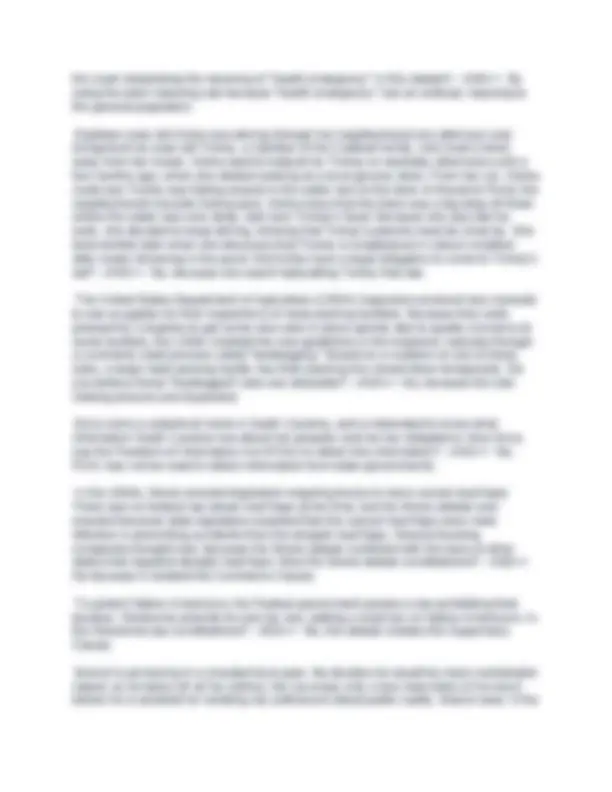
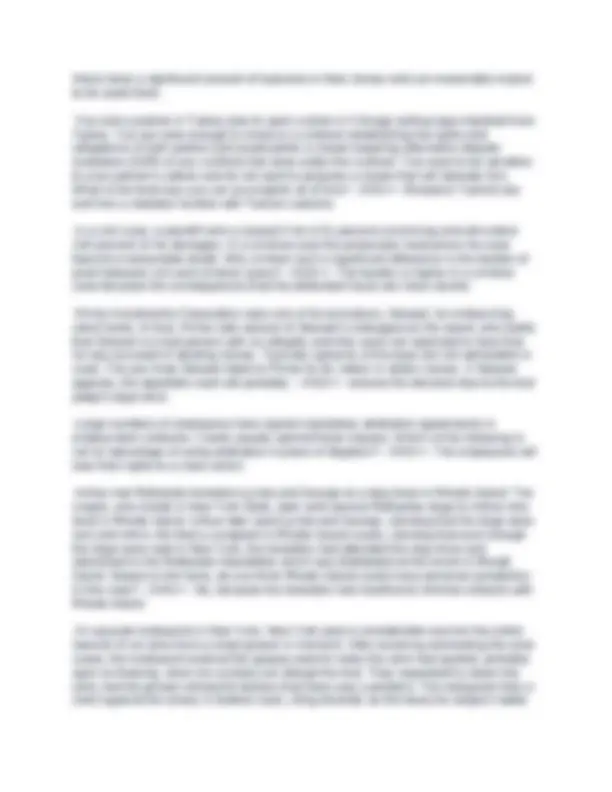
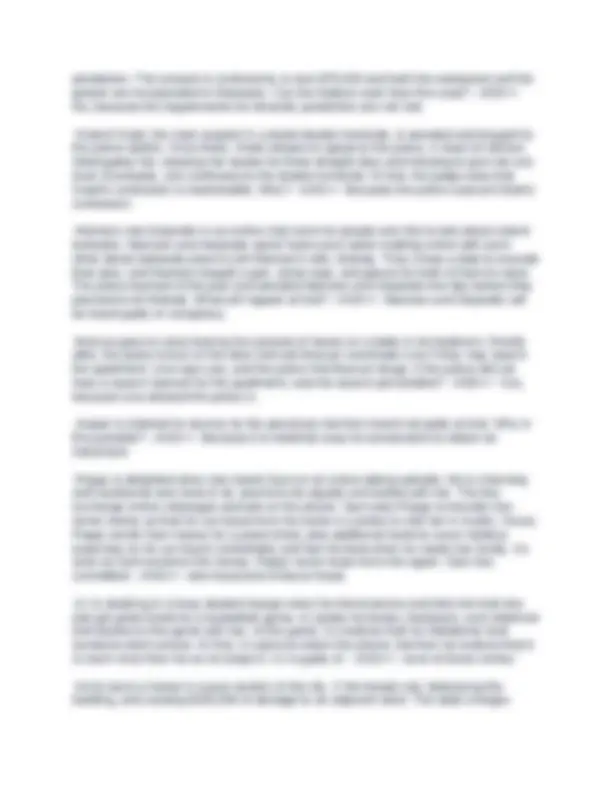
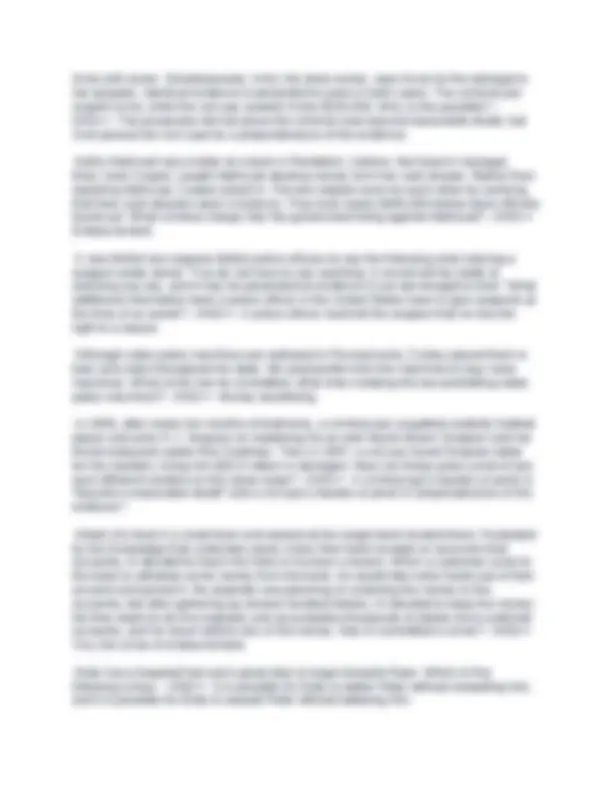
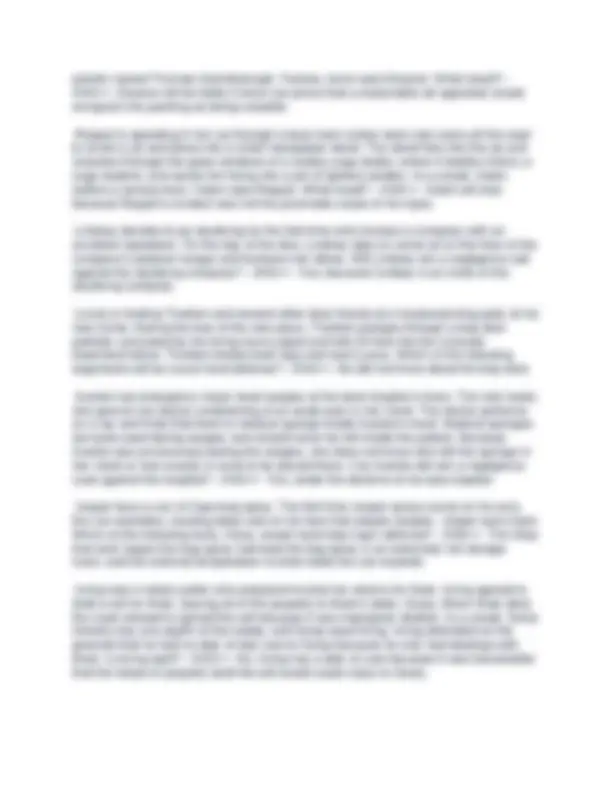



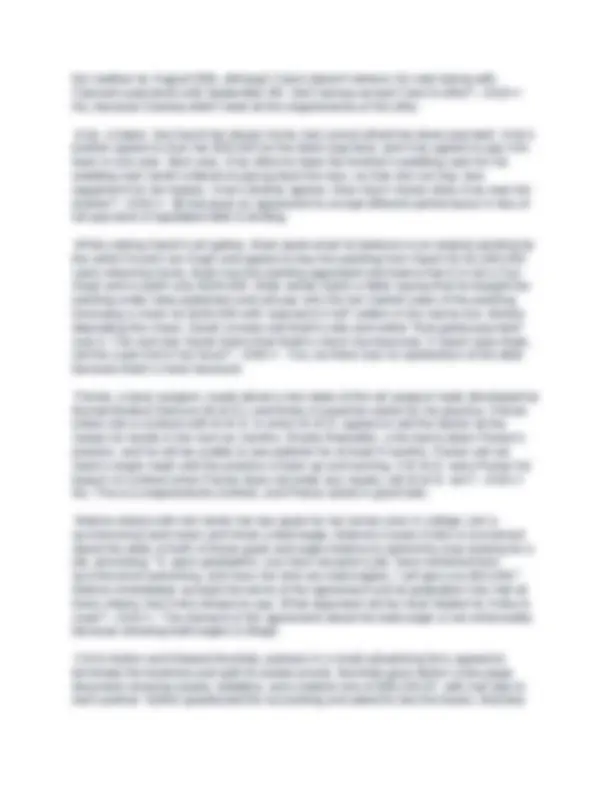



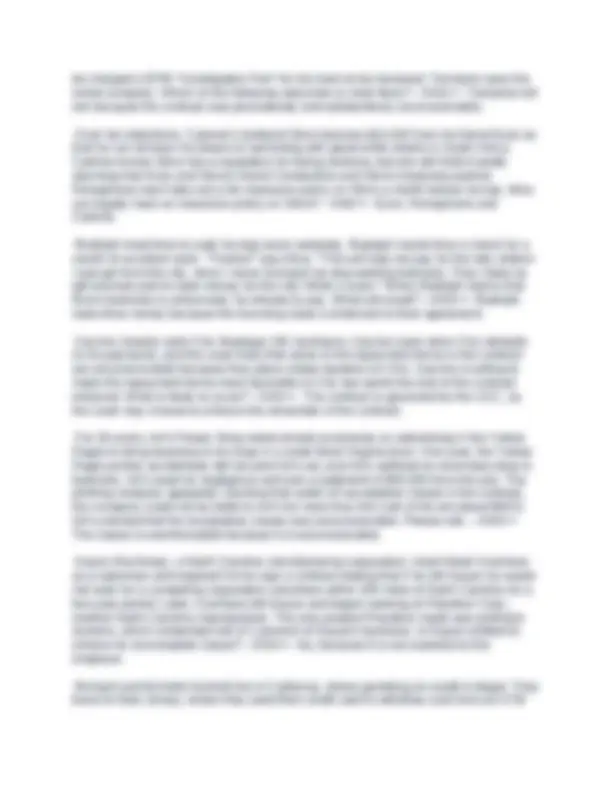



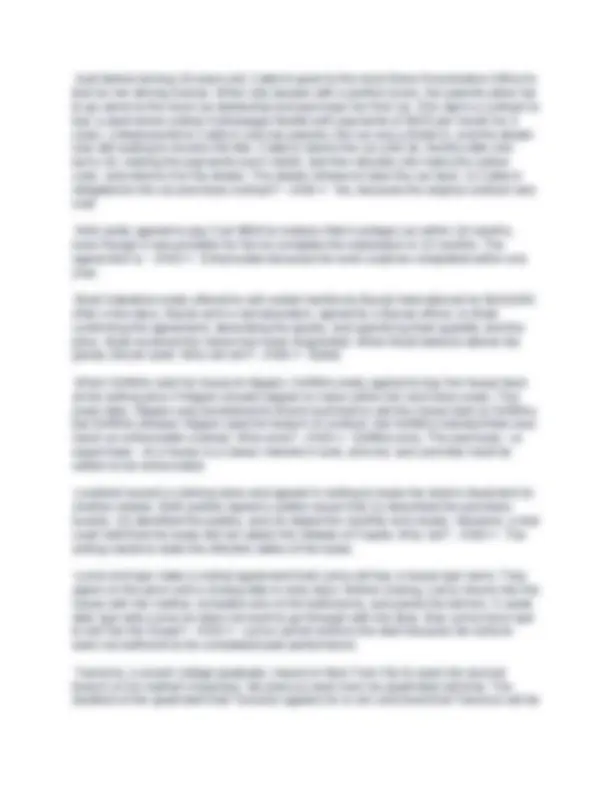
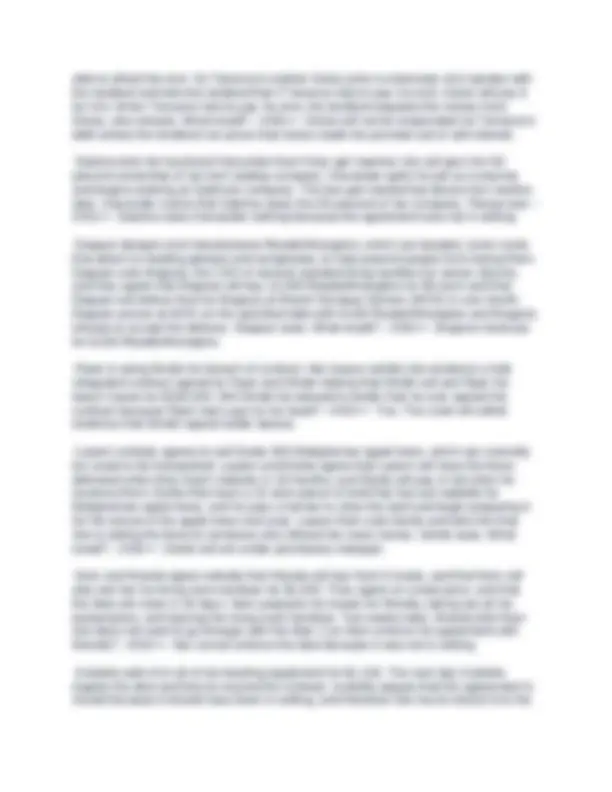

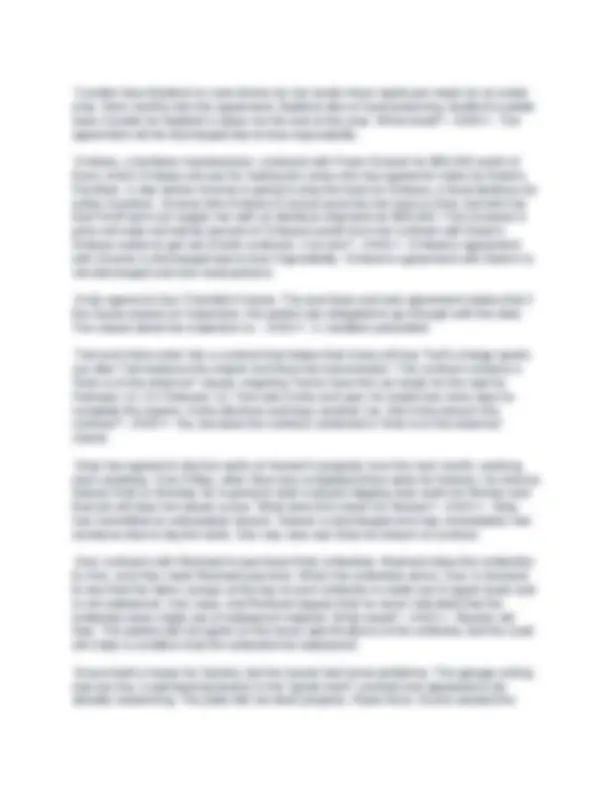
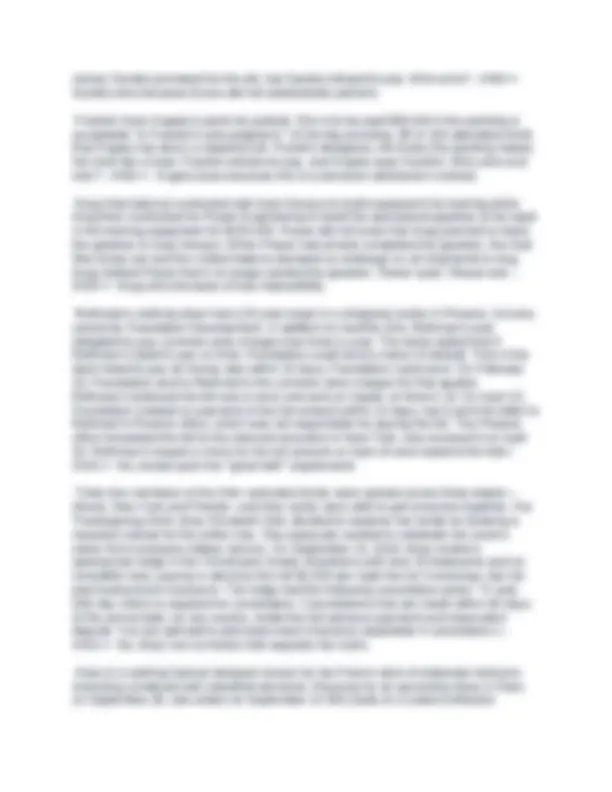







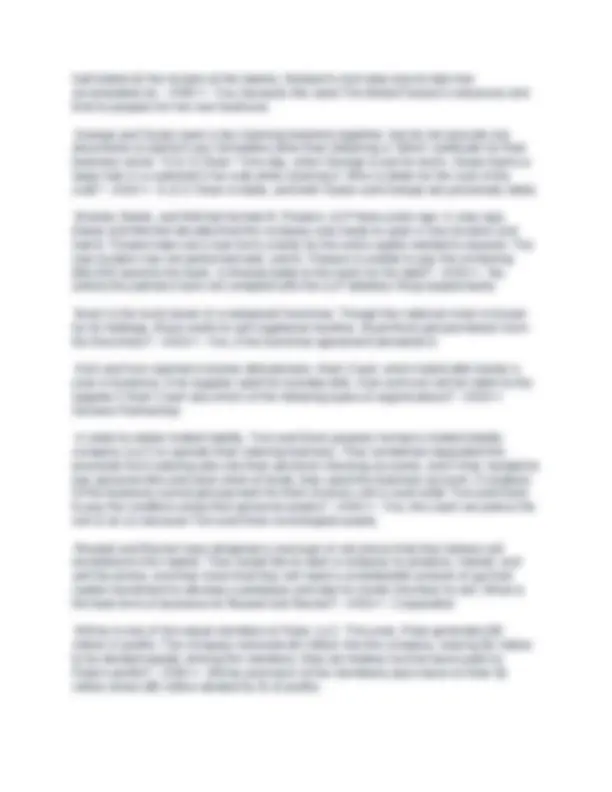

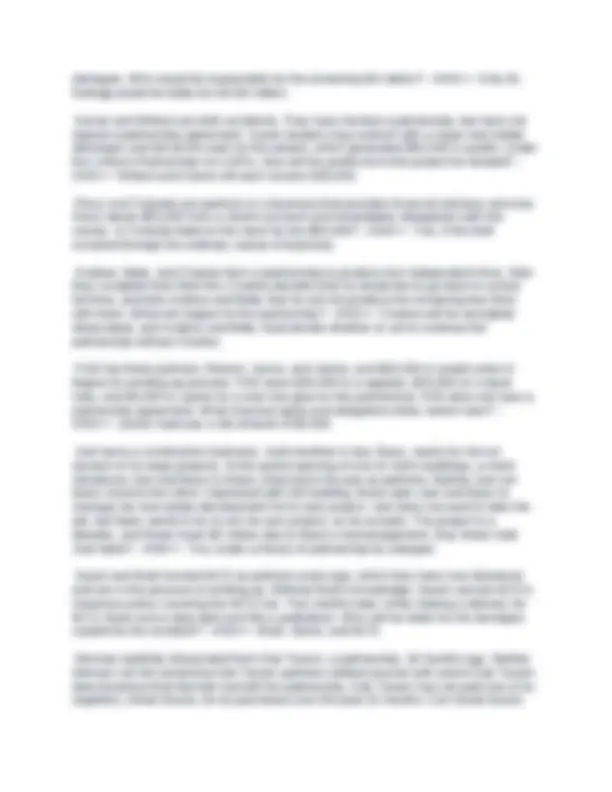
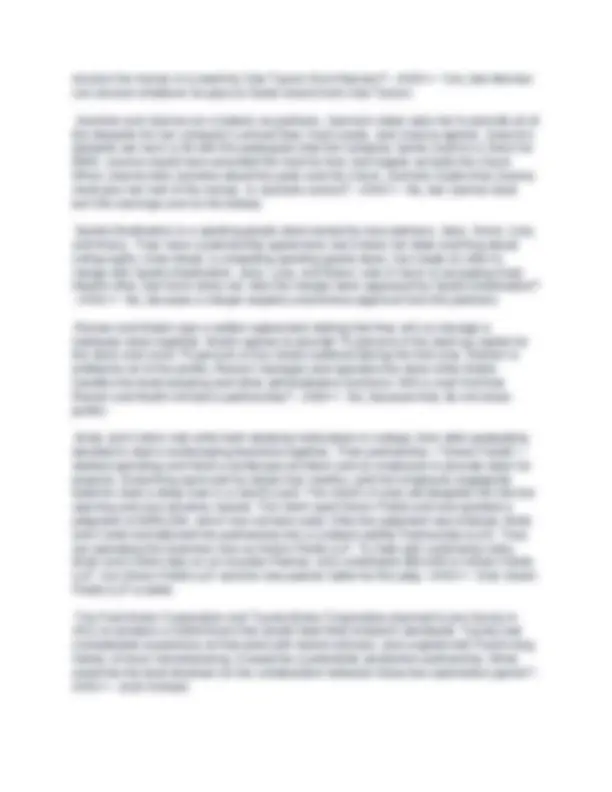
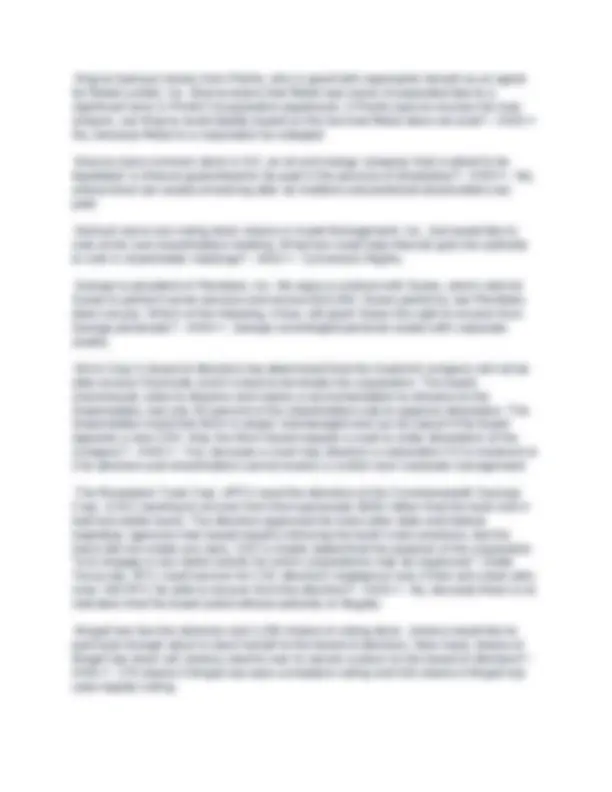

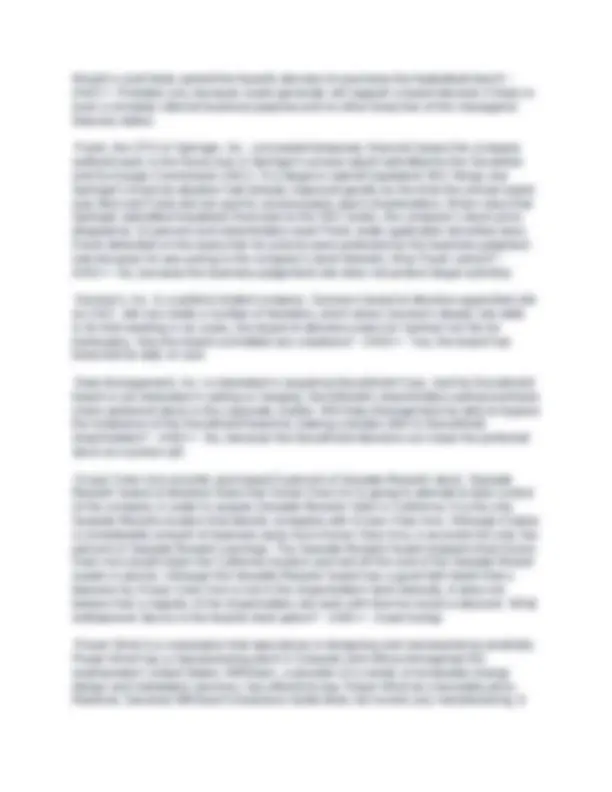


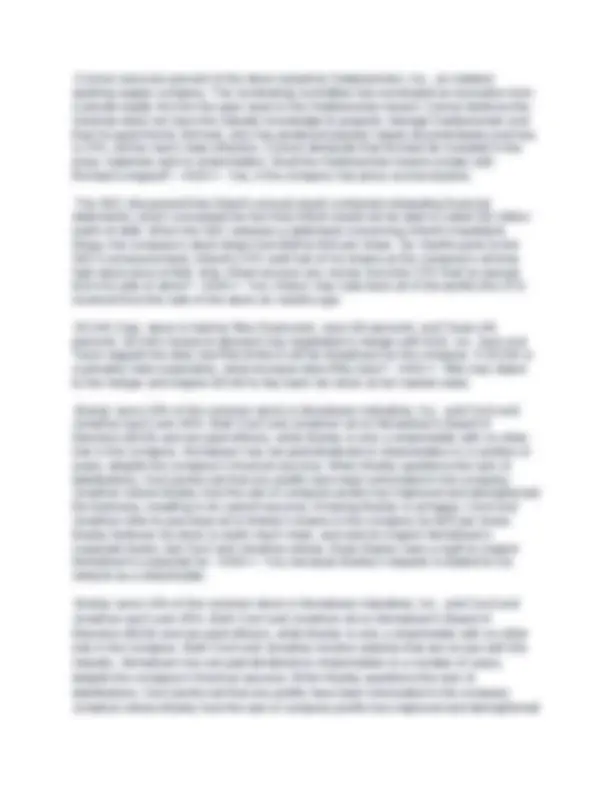



Study with the several resources on Docsity

Earn points by helping other students or get them with a premium plan


Prepare for your exams
Study with the several resources on Docsity

Earn points to download
Earn points by helping other students or get them with a premium plan
Community
Ask the community for help and clear up your study doubts
Discover the best universities in your country according to Docsity users
Free resources
Download our free guides on studying techniques, anxiety management strategies, and thesis advice from Docsity tutors
BLAW final exam practice problems latest update 2024.
Typology: Exams
1 / 49

This page cannot be seen from the preview
Don't miss anything!










































When Sonya Celebrity reads an embarrassing article about herself in Fame magazine, she becomes very worried about damage to her reputation. During her lawsuit against Fame, the magazine's lawyer argues that his client's rights are protected by the Constitution, specifically the right to free press. Is this a civil or criminal lawsuit? On what part of the Constitution is Fame magazine's lawyer basing his argument? - ANS>> This is a civil lawsuit and Fame magazine is basing its argument on the First Amendment to the Constitution. A state trial court held that Raynes Inc. violated its contract with Cranwell Management. Raynes appealed the decision to the state appellate court. If the appellate court remands the case, it is most likely because: - ANS>> the trial court's decision made a mistake in interpreting the law. Ever since a large manufacturing plant opened a quarter mile from Stanley's house, he has been bothered by air pollution and loud noises coming from the plant. Tired of the problems the plant is causing, Stanley goes to civil court seeking a(n) ________ which is a(n) _________ requiring the plant to stop. - ANS>> injunction; court order In the 1980s, the Supreme Court ruled that it was legal for protesters to burn the American flag because this activity counts as free speech under the Constitution. What kind of law is this? - ANS>> Common law In 1994, when the Arizona Supreme Court decided the case of Hernandez v. Arizona Board of Regents, it found a duty of care to avoid providing alcohol to underage consumers. If in 2017 a plaintiff from Flagstaff, Arizona brings a lawsuit in an Arizona state trial court against a student group at an Arizona university for providing alcohol to members under the legal drinking age, will the Hernandez v. Arizona Board of Regents case serve as precedent (assuming no court has overturned it)? - ANS>> Yes, it will be used as precedent and it is binding. Congress passes The Nylon-Free Water Act, a statute making it a crime for commercial fishermen to use nylon fishing nets in water where manatees are found. Now that the Act has passed Congress, who will create regulations for implementing it? - ANS>> An administrative agency. Pursuant to its power under the U.S. Constitution to enact laws affecting the health and safety of its residents, New Jersey lowers its highway speed limits by 10 miles per hour in hopes of reducing traffic deaths. This is an example of what aspect of our government? - ANS>> Federalism.
The president has nominated Judge Mukae to be a federal judge. Before Judge Mukae can be confirmed (that is, officially appointed), she must be ______________________ as a result of our system of _____________________. - ANS>> approved by the Senate; checks and balances. Josh and Colin are driving down the highway in Josh's new convertible. Josh steps on the gas and accelerates to 110 miles per hour, almost double the 60 miles per hour speed limit. Colin urges Josh to slow down, saying, "The law is the law, and you should follow it even if you think it's unfair." Josh responds, "It's unjust to have a law about how fast people can drive their own cars. Let's see how fast I can go!" In this scenario, Josh and Colin's differing legal philosophies seem to adhere most closely to: - ANS>> natural law for Josh, and legal positivism for Colin. In 1997, the Supreme Court declared unconstitutional a provision of a federal gun control law that required state and local governments to conduct a background check on prospective gun purchasers. Under what legal authority did the Supreme Court have the right to declare the provision unconstitutional? - ANS>> Judicial power. In the case of Hammer v. Breidenbach, 31 Mo. 49 (1860), Mr. Breidenbach was hired to brew beer in a cave for his employer, at a salary of $1,000 per year. The contract between the Bavarian Brewery (which would later become Anheuser-Busch) and Mr. Breidenbach specified that any violation of the agreement would result in the breaching party paying the sum of $500 to the injured party. Because the cave was dangerous, Mr. Breidenbach refused to enter it to make the beer, and his employer demanded the $500. An appellate court later determined that Mr. Breidenbach should not be required to enter the cave and endanger himself, and he was not required to pay the $ "penalty." In which of the following modern cases could this case act as an appropriate precedent? - ANS>> A case where a liquidated (pre-determined) damages payment in a contract was excessively disproportionate to the injury. Several U.S. southern states pass a law that restricts the sale of alcohol by businesses on Sunday between the hours of 6AM and midnight. A few weeks later, the federal government passes a law that says "no jurisdiction shall restrict the sale of alcohol in any manner." Would the states still be permitted to restrict sales of alcohol within their borders? - ANS>> No, because federal law preempts state law. Which of the following is true of the basis of the U.S. legal system? - ANS>> It is largely based on the English model with contributions from other societies. No one school of jurisprudence is likely to seem - ANS>> perfect. ____________ is the school of jurisprudence used on the philosophy that what matter is not what is written as law, but who enforces the law and by what process. - ANS>> Legal realism
ANS>> applied the duty of care exception under Tarasoff v. Regents University of California. The IRS promulgates several interpretive rules about corporate tax compliance, particularly for executive compensation. The rules prove to be highly controversial and are a result of misconduct on the part of the head of the IRS. Which of the following statements is correct? - ANS>> The IRS is an executive agency, and the president can fire the head of any executive agency. Clark is outraged when the EPA promulgates a rule stating that lakefront buildings must be set back at least 30 feet from the water. He believes the EPA has exceeded its authority. Clark does not own lake-front property, but some of his best friends do, and he is gravely concerned about this encroachment on their individual property rights. Will Clark be able to bring an action to federal court? - ANS>> No. Clark will not be able to have the administrative rule reviewed in federal court because he has not suffered direct harm. The highest court in Montana must decide a complicated case about the custody of a child conceived by using an egg donor and a surrogate who was raised by an unmarried, homosexual couple. The highest court in Montana has never heard a case like this before, but there is relevant case law in a family court in Montana. Is the highest court bound by the Montana family court's earlier decision? - ANS>> No, because the decision was made in a lower court. Congress has passed a new securities law. If the president disagrees with this statute, what is his/her best course of action? - ANS>> The president can veto the bill. Federal antitrust statutes are complex, but the basic goal is straightforward: to prevent a major industry from being so dominated by a small group of corporations that they destroy competition and injure consumers. Does Major League Baseball violate the antitrust laws? Many observers say that it does. A small group of owners not only dominate the industry but actually own it, controlling the entry of new owners into the game. This issue went to the United States Supreme Court in 1922. Justice Holmes ruled, perhaps surprisingly, that baseball is exempt from the antitrust laws, holding that baseball is not "trade or commerce." Suppose that a congressman dislikes this ruling and dislikes the current condition of baseball. What could he/she do? - ANS>> The congressman could introduce a bill overruling the Supreme Court's interpretation of federal antitrust statutes. Mark's state legislature passed a law that requires restaurant employees to receive four hours of first aid training that must include instruction on the Heimlich maneuver. The law also requires that employees take reasonable efforts to provide assistance to any customers who experience a health emergency at a restaurant. Mark, a restaurant server, received the required training but did nothing to help a customer who choked on his food at Mark's restaurant. When Mark is charged with violating the statute, he argues that he did not believe that choking qualified as a health emergency. How will
the court interpreting the meaning of "health emergency" in this statute? - ANS>> By using the plain meaning rule because "health emergency" has an ordinary meaning to the general population. Eighteen-year-old Alisha was driving through her neighborhood one afternoon and recognized six-year-old Timmy, a member of the Caldwell family, who lived a block away from her house. Alisha used to babysit for Timmy on weekday afternoons until a few months ago, when she started working at a local grocery store. From her car, Alisha could see Timmy was flailing around in the water next to the dock of Maverick Pond, the neighborhood's favorite fishing spot. Alisha knew that the there was a big drop off there where the water was very deep, well over Timmy's head. Because she was late for work, she decided to keep driving, thinking that Timmy's parents must be close by. She feels terrible later when she discovers that Timmy is hospitalized in critical condition after nearly drowning in the pond. Did Alisha have a legal obligation to come to Timmy's aid? - ANS>> No, because she wasn't babysitting Timmy that day. The United States Department of Agriculture (USDA) inspectors received new manuals to use as guides for their inspections of meat packing facilities. Because they were pressed by Congress to get some new rules in place quickly due to quality concerns at some facilities, the USDA inserted the new guidelines in the inspector manuals through a commonly used process called "bootlegging." Based on a violation of one of these rules, a large meat packing facility has their packing line closed down temporarily. Do you believe these "bootlegged" rules are allowable? - ANS>> No, because the rule- making process was bypassed. Erica owns a waterfront home in South Carolina, and is interested to know what information South Carolina has about her property and her tax obligations. May Erica use the Freedom of Information Act (FOIA) to obtain this information? - ANS>> No. FOIA may not be used to obtain information from state governments. In the 1950s, Illinois enacted legislation requiring trucks to have curved mud flaps. There was no federal law about mud flaps at the time, but the Illinois statute was enacted because state legislators asserted that the curved mud flaps were more effective in preventing accidents than the straight mud flaps. Several trucking companies brought suit, because the Illinois statute conflicted with the laws of other states that required straight mud flaps. Was the Illinois statute constitutional? - ANS>> No because it violated the Commerce Clause. To protect Native Americans, the Federal government passes a law prohibiting their taxation. Oklahoma amends its own tax law, adding a small tax on Native Americans. Is the Oklahoma law constitutional? - ANS>> No, the statute violates the Supremacy Clause. Marcel is picnicking in a crowded local park. He decides he would be more comfortable naked, so he takes off all his clothes. He can enjoy only a few more bites of his lunch before he is arrested for violating city ordinances about public nudity. Marcel sues. If the
Jason was a restaurant server with six years of experience who recently relocated to the Northeast. The new town he lived in had only a small number of restaurants, the busiest one being part of the chain "Hooters." Although the Hooters restaurant is known for only hiring young, attractive females as servers, Jason applies for a wait staff position, and is turned down because he is a male. Is Hooter's required to hire Jason for a server position? - ANS>> No, because the position of server has a bona fide occupational qualification. Claudia and Patrick would like to dissolve their business partnership. They are confident that they can work collaboratively on the terms of the settlement, but they do not have much money to spend on the process and are nervous about the prospect of the terms being decided by a third party who is unfamiliar with them and their industry. Which of the following legal processes is a good choice for them? - ANS>> Mediation. Statutory rape is a crime in which a defendant has sexual intercourse with a person who is too young to give legal consent for the action. In a criminal case involving an alleged statutory rape, the age of the victim at the time of the offense is an issue to be determined by: - ANS>> the jury in a trial court. Eliza (female) has been working as an administrative assistant at Giant Coalmine Corp. for two years. Recently, several of her male coworkers, including some of the company's executives, have started sexually harassing Eliza by engaging in unwanted sexual advances, abusive language, and threatening behavior. Eliza has discussed this situation with her female coworkers, several of whom have experienced a similar pattern of inappropriate treatment. The women feel intimidated and worry about losing their jobs if they complain. What can Eliza and her attorney do to strengthen their case against Giant Coalmine? - ANS>> File a class action lawsuit against Giant Coalmine. During discovery, lawyers for the defense find out that the plaintiff was hospitalized in a psychiatric facility last April. If the court grants the defense access to the plaintiff's full medical records from that hospitalization, it is most likely because: - ANS>> the plaintiff's mental condition is relevant to the case. Marshall claims that Victor breached their contract and sues him in district court, seeking $80,000 in damages. If the trial is being held without a jury, it is most likely because: - ANS>> both parties waived their right to a jury. Miles is floating happily on a rubber raft in his swimming pool in New Jersey when the raft busts and cuts his eye. His doctor says he will need corrective surgery and may never fully regain his eyesight in the damaged eye. Miles learns that the raft was manufactured in Louisiana by Intack Inc., a company headquartered in New Mexico. Miles bought the raft from a Kidz Toyz store, a chain of stores in New Jersey that sells many Intack products. Miles sues Intack in a New Jersey federal court for $100,000. Intack files a motion to have the case moved to federal court in New Mexico, saying that New Jersey lacks jurisdiction over the case. Is Intack correct? - ANS>> Probably not.
Intack does a significant amount of business in New Jersey and can reasonably expect to be sued there. You and a partner in Turkey plan to open a store in Chicago selling rugs imported from Turkey. You are wise enough to insist on a contract establishing the rights and obligations of both parties and would prefer a clause requiring alternative dispute resolution (ADR) of any conflicts that arise under the contract. You want to be sensitive to your partner's culture and do not want to propose a clause that will alienate him. What is the best way you can accomplish all of this? - ANS>> Research Turkish law and hire a mediator familiar with Turkish customs. In a civil case, a plaintiff wins a lawsuit if he is 51 percent convincing and will collect 100 percent of his damages. In a criminal case the prosecutor must prove his case beyond a reasonable doubt. Why is there such a significant difference in the burden of proof between civil and criminal cases? - ANS>> The burden is higher in a criminal case because the consequences that the defendant faces are more severe. Prime Investments Corporation sues one of its executives, Stewart, for embezzling client funds. At trial, Prime calls several of Stewart's colleagues to the stand, who testify that Stewart is a bad person with no integrity and they were not surprised to hear that he was accused of stealing money. Typically opinions of this type are not admissible in court. The jury finds Stewart liable to Prime for $1 million in stolen money. If Stewart appeals, the appellate court will probably: - ANS>> reverse the decision due to the trial judge's legal error. Large numbers of employees have signed mandatory arbitration agreements in employment contracts. Courts usually uphold these clauses. Which of the following is not an advantage of using arbitration in place of litigation? - ANS>> The employees will lose their rights to a class action. Arthur met Rottweiler breeders Lynda and George at a dog show in Rhode Island. The couple, who reside in New York State, later sold several Rottweiler dogs to Arthur who lived in Rhode Island. Arthur later sued Lynda and George, claiming that the dogs were sick and infirm. He filed a complaint in Rhode Island courts, claiming that even though the dogs were sold in New York, the breeders had attended the dog show and advertised in the Rottweiler Newsletter which was distributed at the event in Rhode Island. Based on the facts, do you think Rhode Island courts have personal jurisdiction in this case? - ANS>> No, because the breeders had insufficient minimal contacts with Rhode Island. An upscale restaurant in New York, New York paid a considerable sum for the entire harvest of ice wine from a small grower in Vermont. After receiving and testing the wine cases, the restaurant realized the grapes used to make the wine had spoiled, probably upon re-thawing, when ice crystals can disrupt the fruit. They requested to return the wine, but the grower refused to believe that there was a problem. The restaurant files a claim against the winery in federal court, citing diversity as the basis for subject matter
Arnie with arson. Simultaneously, Vicki, the store owner, sues Arnie for the damage to her property. Identical evidence is presented to juries in both cases. The criminal jury acquits Arnie, while the civil jury awards Vickie $150,000. Why is this possible? - ANS>> The prosecutor did not prove the criminal case beyond reasonable doubt, but Vicki proved her civil case by a preponderance of the evidence. Kathy Hathcoat was a teller at a bank in Pendleton, Indiana. Her branch manager, Mary Jane Cooper, caught Hathcoat stealing money from her cash drawer. Rather than reporting Hathcoat, Cooper joined in. The two helped cover for each other by verifying that their cash drawers were in balance. They took nearly $200,000 before bank officials found out. What criminal charge may the government bring against Hathcoat? - ANS>> Embezzlement. A new British law requires British police officers to say the following when placing a suspect under arrest: "You do not have to say anything. A record will be made of anything you say, and it may be presented as evidence if you are brought to trial." What additional information does a police officer in the United States have to give suspects at the time of an arrest? - ANS>> A police officer must tell the suspect that he has the right to a lawyer. Although video poker machines are outlawed in Pennsylvania, Conley placed them in bars and clubs throughout the state. He used profits from the machines to buy more machines. What crime has he committed, other than violating the law prohibiting video poker machines? - ANS>> Money laundering. In 1995, after nearly ten months of testimony, a criminal jury acquitted celebrity football player and actor O.J. Simpson of murdering his ex-wife Nicole Brown Simpson and her friend restaurant waiter Ron Goldman. Then in 1997, a civil jury found Simpson liable for the murders, fining him $33.5 million in damages. How can these juries come to two such different verdicts on the same issue? - ANS>> A criminal jury's burden of proof is "beyond a reasonable doubt" and a civil jury's burden of proof is "preponderance of the evidence." Albert (Al) lived in a small town and worked at the single bank located there. Frustrated by the knowledge that customers rarely check their bank receipts or reconcile their accounts, Al decided to teach the folks in his town a lesson. When a customer came to the bank to withdraw some money from the bank, he would take extra funds out of their account and pocket it. He originally was planning on restoring the money to the accounts, but after gathering up several hundred dollars, Al decided to keep the money. He then starts to do this regularly and accumulates thousands of dollars from customer accounts, and he never returns any of the money. Has Al committed a crime? - ANS>> Yes, the crime of embezzlement. Dolly has a baseball bat and a great deal of anger towards Peter. Which of the following is true: - ANS>> It is possible for Dolly to batter Peter without assaulting him, and it is possible for Dolly to assault Peter without battering him.
D'Arcy, who is not a public figure, brings a libel suit against Mary. At trial, D'Arcy fails to prove injury or actual malice, but he wins the suit anyway. Which of the following must be true? - ANS>> D'Arcy sued Mary because she wrote an article that said he had been convicted of tax fraud, when he had not. One day, while drawing a patient's blood, nurse Athena accidentally pricks herself with the needle that she had just used on the patient. Rebecca, another nurse at the hospital, warns Athena that the patient has Hepatitis C, a virus that can spread through a shared needle. Athena becomes visibly distraught, and Rebecca tells nurse Edwin that Athena now has Hepatitis C. In fact, Rebecca made the whole thing up. She knew the patient had no such illness and just wanted to embarrass her co-worker. Rebecca may be found liable for: - ANS>> intentional infliction of emotional distress and slander. After he is injured in an accident, Conrad successfully sues the driver and the trucking company. The jury awards him money for past lost earning capacity, past and future physical symptoms and discomfort, and past emotional injury and mental anguish. If Conrad's injuries require him to be out of work for much longer than anticipated, can he later file another suit against the driver and the trucking company for his unforeseen lost wages? - ANS>> No, under the single recovery principle. Taterz Potato Chip Company posted a billboard along the highway with a photo of NBA basketball superstar LeBron Smith eating their chips. Smith was furious. He did not endorse the chips, and he did not want his fans to think he ate unhealthy snacks. Smith sues Taterz. What result? - ANS>> Taterz is liable for commercial exploitation. Lucia is very interested in buying Charlotte's apartment and has toured it several times. She pays Charlotte $5,000 to hold the offer open (that is, not to sell the apartment to anyone else) for three days, so that Lucia can think it over. The next day, Lucia's realtor, Antonio, shows her an apartment that she prefers. Lucia buys it on the spot. Charlotte sues Antonio for tortious interference with a contract. What result? - ANS>> Charlotte loses because she did not have a contract with Lucia for the sale of the apartment. You are a vice-president in charge of personnel at a large manufacturing company. In- house detectives inform you that Gates, an employee, was seen stealing valuable computer equipment. Gates denies the theft, but you believe the detectives and fire him. The detectives suggest that you post notices around the company informing all employees what happened to Gates and why. This will discourage others from stealing. Should you post the notices? - ANS>> No, posting the sign could give rise to a claim of defamation. Caldwell was shopping at T-Mart department store, carrying a large purse. A security guard observed her looking at various small items for sale. At one point, Caldwell put her reading glasses in her purse, and the guard thought she might have been shoplifting. The guard approached her in the parking lot and accused her of taking store merchandise. The guard found no stolen goods in her purse but had her return to the
painter named Thomas Gainsborough. Furious, Irene sues Eleanor. What result? - ANS>> Eleanor will be liable if Irene can prove that a reasonable art appraiser would recognize the painting as being valuable. Raquel is speeding in her car through a busy town center when she veers off the road to avoid a cat and plows into a small newspaper stand. The stand flies into the air and smashes through the glass windows of a nearby yoga studio, where it startles Adam, a yoga student, and sends him flying into a set of lighted candles. As a result, Adam suffers a serious burn. Adam sues Raquel. What result? - ANS>> Adam will lose because Raquel's conduct was not the proximate cause of his injury. Lindsay decides to go skydiving for the first time and chooses a company with an excellent reputation. On the day of the dive, Lindsay slips on some oil on the floor of the company's airplane hangar and fractures her elbow. Will Lindsay win a negligence suit against the skydiving company? - ANS>> Yes, because Lindsay is an incite of the skydiving company. Lucas is hosting Thorben and several other dear friends at a housewarming party at his new home. During the tour of the new place, Thorben plunges through a trap door partially concealed by the living room carpet and falls 20 feet into the concrete basement below. Thorben breaks both legs and sues Lucas. Which of the following arguments will be Lucas' best defense? - ANS>> He did not know about the trap door. Aurelia has emergency major heart surgery at the best hospital in town. The next week, she goes to her doctor complaining of an acute pain in her chest. The doctor performs an x-ray and finds that there is medical sponge inside Aurelia's chest. Medical sponges are tools used during surgery and should never be left inside the patient. Because Aurelia was unconscious during the surgery, she does not know who left the sponge in her chest or how exactly it came to be placed there. Can Aurelia still win a negligence case against the hospital? - ANS>> Yes, under the doctrine of res ipsa loquitur. Jasper buys a can of Zaps bug spray. The first time Jasper sprays some on his arm, the can explodes, causing deep cuts on his face that require surgery. Jasper sues Zaps. Which of the following facts, if true, would most help Zaps' defense? - ANS>> The shop that sold Jasper the bug spray had kept the bug spray in an extremely hot storage room, and the extreme temperature is what made the can explode. Irving was a notary public who prepared income tax returns for Mark. Irving agreed to draft a will for Mark, leaving all of the property to Mark's sister, Sonja. When Mark died, the court refused to uphold the will because it was improperly drafted. As a result, Sonja inherits only one eighth of the estate, and Sonja sued Irving. Irving defended on the grounds that he had no duty of due care to Sonja because he only had dealings with Mark. Is Irving right? - ANS>> No, Irving has a duty of care because it was foreseeable that the failure to properly draft the will would cause injury to Sonja.
A new truck, manufactured by General Motors Corp. (GMC), had a defective alternator that caused it to stall on a busy highway. The driver set up emergency flares around the stalled truck, but congestion on the highway made them difficult to see. Davis did not see the flares, drove his car into the back of the stalled truck, and was killed by the impact. His widow sues GMC. GMC moved for summary judgment, alleging (1) no duty to Davis, (2) no factual causation, and (3) no foreseeable harm. Should summary judgment be granted? - ANS>> No, because there was factual cause, and the injury was foreseeable. Harris walked onto some train tracks, ignoring a yellow warning line painted on the station platform, shouts from concerned onlookers, and the ringing bells and flashing lights signaling the approach of an express train. The train killed Harris, and his widow sued the railroad arguing that its negligence caused her husband's death. Will she win?
electrical heat in a housing project it was constructing in Waterville, Maine. MSI built the units and requested payment for the full amount of the promotional offer. Is CMPC obligated to pay? Why or why not? - ANS>> Yes, CMPC is obligated to pay because this was a unilateral contract, and MSI performed. Interactive Data Corp. hired Foley as an assistant product manager, and over the next six years, Interactive steadily promoted him. Interactive officers repeatedly told Foley that he would have his job as long as his performance was adequate. They also distributed an employee handbook that specified termination guidelines that included a mandatory seven-step pre-termination procedure. Foley learned that his supervisor was under investigation by the FBI, and he told Interactive officers. Shortly thereafter, Interactive fired Foley. He sued, claiming that Interactive could fire him only for good cause after the seven-step procedure. Who wins? - ANS>> Interactive loses because it had an implied employment contract with Foley that incorporated the seven steps. The Hoffmans owned and operated a successful small bakery. Lukowitz, an agent of Red Owl Stores, told them that for $18,000 Red Owl would build a store and fully stock it for them to operate. The Hoffmans sold their bakery and purchased a lot on which Red Owl was to build the store. Lukowitz then told the Hoffmans that the price had gone up to $26,000. The Hoffmans borrowed the extra money from relatives, but then Lukowitz informed them that the cost would be $34,000. Negotiations broke off and the Hoffmans sued. The court determined that there was no contract. Can the Hoffmans recover any money? - ANS>> Yes. They can most likely recover damages based on promissory estoppel. While negotiating with Stewart to purchase his house, Yasmine asks him about the condition of the roof. "Excellent," he replies. "It is only 2 years old, and should last 25 more." In fact, Stewart knows that the roof is 26 years old and has had a series of leaks. The parties sign a sales contract for $600,000. A week before Yasmine is to pay for the house and take possession, she discovers the leaks and learns that a new roof will cost $35,000. What kind of contract exists between Yasmine and Stewart? - ANS>> Voidable by Yasmine Simon, aged 10, is invited to a classmate's birthday party at an exclusive ski resort on March 15th. The day will include 4 hours of snowboarding, lunch and birthday cake. Simon's mother checks a box on the invitation that says "YES, we will attend" and returns it to the classmate's address. Unfortunately, they later don't attend the party when Simon comes down with the flu. On March 17th, Simon's mother receives an invoice in the mail from Simon's classmate for $35 that says, "Party No-Show Fee." Can Simon's classmate collect the fee? - ANS>> No, because there was no intent to form a contract by Simon's mother. Xuechen graduated from culinary school at the top of her class, and signed an employment contract to work as a chef for one of Chicago's best restaurants for a period of three years. Additionally, Xuechen signed a non-competition agreement that stated she agreed not work as a chef for any other restaurant in the Chicago city area
for a period of five years. Shortly after she began working, Xuechen left her employer to work as a manager at another Chicago restaurant. Has Xuechen breached either of the contracts she signed? - ANS>> Yes, the employment contract has been breached, but the non-competition agreement has not been breached. The town of Sanford, Maine, decided to auction off a plot of land owned by the town. The town advertised that it would accept bids through the mail, up to a specified date. Arthur and Arlene mailed in a bid that turned out to be the highest of all the bids the town received. When the town refused to sell them the lot, they sued. Who will win? - ANS>> It will depend on whether the auction was with or without a reserve, or minimum price. The Tufte family leased a 260-acre farm from the Travelers, Inc. Toward the end of the lease, Travelers mailed the Tuftes an option to renew the lease. The option arrived at the Tuftes' house on March 30 and stated that they had until April 14 to accept. On April 13, the Tuftes signed and mailed their acceptance, which Travelers received on April
the mailbox by August 30th, although Calvin doesn't retrieve his mail (along with Clarissa's payment) until September 4th. Did Clarissa accept Calvin's offer? - ANS>> No, because Clarissa didn't meet all the requirements of the offer. Amy, a baker, has found her dream home, but cannot afford the down payment. Amy's brother agrees to loan her $30,000 for the down payment, and Amy agrees to pay him back in one year. Next year, Amy offers to bake her brother's wedding cake for his wedding next month instead of paying back the loan, so that she can buy new equipment for her bakery. Amy's brother agrees. How much money does Amy owe her brother? - ANS>> $0 because an agreement to accept different performance in lieu of full payment of liquidated debt is binding. While visiting Sarah's art gallery, Mark spots what he believes is an original painting by the artist Vincent van Gogh and agrees to buy the painting from Sarah for $1,000,000. Upon returning home, Mark has the painting appraised and learns that it is not a Van Gogh and is worth only $100,000. Mark sends Sarah a letter saying that he bought the painting under false pretenses and will pay only the fair market value of the painting, enclosing a check for $100,000 with "payment in full" written in the memo line. Before depositing the check, Sarah crosses out Mark's note and writes "first partial payment" over it. The next day Sarah learns that Mark's check has bounced. If Sarah sues Mark, will the court find in her favor? - ANS>> Yes, as there was no satisfaction of the debt because Mark's check bounced. Florian, a busy surgeon, reads about a new state-of-the-art surgical mask developed by Myriad Medical Devices (M.M.D.) and thinks it would be useful for his practice. Florian enters into a contract with M.M.D. in which M.M.D. agrees to sell the doctor all the masks he needs in the next six months. Shortly thereafter, a fire burns down Florian's practice, and he will be unable to see patients for at least 9 months. Florian will not need a single mask until the practice is back up and running. If M.M.D. sues Florian for breach of contract when Florian does not order any masks, will M.M.D. win? - ANS>> No. This is a requirements contract, and Florian acted in good faith. Helena shares with her family her two goals for her senior year in college: join a synchronized swim team and shoot a bald eagle. Helena's cousin Anika is concerned about the utility of both of these goals and urges Helena to spend the year looking for a job, promising, "If, upon graduation, you have secured a job, have refrained from synchronized swimming, and have not shot any bald eagles, I will give you $10,000." Helena immediately accepts the terms of the agreement and at graduation has met all three criteria, but Anika refuses to pay. What argument will be most helpful for Anika in court? - ANS>> The element of the agreement about the bald eagle is not enforceable because shooting bald eagles is illegal. CeCe Hylton and Edward Meztista, partners in a small advertising firm, agreed to terminate the business and split its assets evenly. Meztista gave Hylton a two-page document showing assets, liabilities, and a bottom line of $35,235.67, with half due to each partner. Hylton questioned the accounting and asked to see the books. Meztista
did not permit Hylton to see any records and refused to answer her phone calls. Instead, he gave her a check in the amount of $17,617.83, on which he wrote "Final payment/payment in full." Hylton cashed the check, but she wrote on it, "Under protest —cashing this check does not constitute my acceptance of this amount as payment in full." Hylton then filed suit, demanding additional monies. Meztista defended on the grounds that the parties had made an accord and satisfaction. What is the likely result?